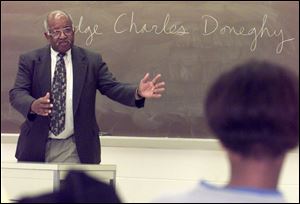
Government `retirees' keep day jobs
2/5/2001
Sheriff James Telb retired in the summer to avoid losing cash. An $80,000 pension augments his $78,000 salary.
FRASER
Lucas County Sheriff James Telb is not the only elected official to “retire” and retain his post - a legal maneuver that allows him to collect his salary and draw thousands of dollars in pension at the same time.
Since the November general election, The Blade has learned that Ohio 6th District Court of Appeals Judge Peter Handwork, Lucas County Common Pleas judges James Bates and Charles Doneghy, and County Commissioner Bill Copeland are among dozens of government officials who have taken advantage of a change in state law so they can stay on the job and receive a pension sooner.
Judge Bates, Judge Doneghy, and Mr. Copeland, all of whom were re-elected in November, took no time off from work and were able to start their terms at the beginning of the year.
Judge Handwork, who also was re-elected in November, left work Nov. 30 and will return Friday, when his new term begins.
All will receive their salaries and their pensions while still in office.
A law that took effect in September allows government employees who have the right combination of age and years of service to wait two months, instead of the previous six-month period, before drawing a pension - if they continue to work.
Though the practice is legal, Thomas Moyer, Chief Justice of the Ohio Supreme Court, said he does not approve of judges doing it because it gives the appearance of “double-dipping,” a practice in which a person draws two salaries from the government.
“I think it's working the system,” Justice Moyer said. “It's taking advantage of a provision of the statute that I don't think is good public policy. If a person is truly retired, they're retired. If they plan to continue to serve as an elected judge, that's a different status. They should choose one or the other.”
Judge Bates said he knew before he retired that some people would be unhappy with his decision. But after determining it is legal and would not cost taxpayers additional money, he said too much was at stake for him financially to turn it down.

Judge Charles Doneghy said he knew taking his pension draw would draw controversy.
“This is a retirement program completely separate, like your own 401(k),” Judge Bates said. “You put money in and the state puts money in. It's not going to cost the taxpayers one extra dollar because the money I'm receiving is from this private retirement system.”
The Public Employee Retirement System (PERS) handles pensions for city, county, and state workers. The workers pay 8.5 percent of their wages into the system, which the state matches.
A public employee is allowed to draw a pension at any age if he or she has worked 30 years; at age 55 after working 25 years, or at age 60 after five years of service.
Judge Bates, 53, and Judge Doneghy, 62, who were assistant prosecutors early in their careers, will earn roughly $60,000 from their pensions annually in addition to their salaries. This year, common pleas judges earn $103,500.
A PERS pension is based on two-thirds of the average of an employee's top three years of salary. By drawing their pension now, the judges gave up higher pensions later that would have been based on higher base salaries. The amount of their pensions are not a matter of public record.
Judge Handwork, 59, would not say how much his pension will be but said it will be roughly based on a wage of about $106,000 annually. That puts his pension at nearly $70,000 a year. This year, appeals court judges will be paid $112,550.
Mr. Copeland said he didn't know how much pension he will be receiving. “I'm not in it for the money,” he explained.
His commissioner's salary this year is about $74,000. Based on an average of $70,000 annually, his pension likely will be in the $46,000 range.
Some of the officials said they decided to draw their pensions after Sheriff Telb retired in the summer to avoid losing as much as $40,000 annually because of a change in state regulations. His salary of $78,000 is now augmented by a pension of about $80,000, which is based on a combination of his sheriff's salary and pension money he earned as a teacher.

Sheriff James Telb retired in the summer to avoid losing cash. An $80,000 pension augments his $78,000 salary.
William Sharon, PERS benefits disbursement manager, said elected officials are not the only government workers to begin drawing pensions while continuing to work. He said it has become common regardless of one's job, and he doesn't think there's anything underhanded about it.
“The individual has earned the retirement benefit,” Mr. Sharon said. “The system took their contributions over those years of service. It's been invested, and it's earned interest.
“This isn't coming out of your pocket or my pocket. It's coming out of the system.”
Anne Larrison, executive director of the Ohio Judicial Conference, said the state organization does not track how many judges are retiring to draw a pension.
“I've talked to some judges over the last few days, and they are not happy,” Ms. Larrison said. “They understand that it's legal, but they have a concern about public confidence.”
Judge Doneghy said most people he has spoken with have been supportive of his decision but added that he knew the early pension draw had the potential for controversy.
“I weighed those concerns and the reality of my own personal situation and my responsibility to my family,” Judge Doneghy said. “Taking all those factors into account, and because it was quite legal and quite proper, I elected to go ahead and take advantage of the retirement that was available to me.”
Judge Handwork said his 60-day leave has not hurt the operations of the appeals court, which has five judges to comprise three-judge panels. He said it would have been “ridiculous” for him not to take his pension.
“Frankly, it was a pretty easy decision to make from a financial point of view,” Judge Handwork said. “You'd be kind of foolish not to utilize the benefits the law allows you.”